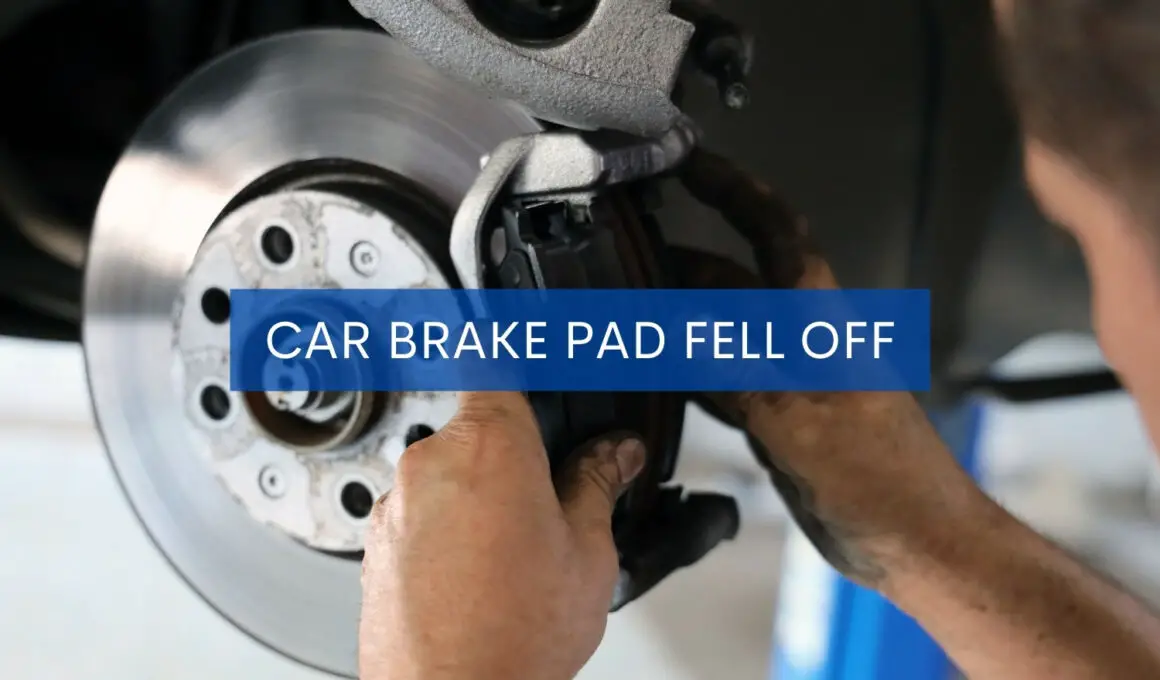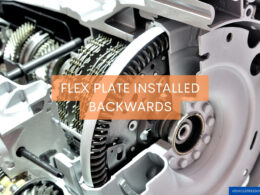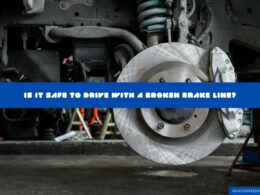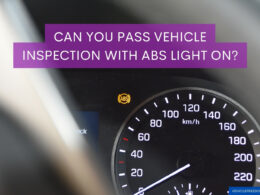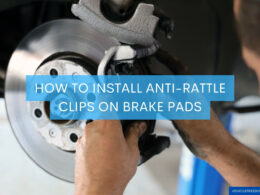In This Article Show
Today, I’d like to discuss a particularly problematic occurrence that many car owners may overlook until it’s too late – the falling off of a brake pad.
Brake pads are crucial to your vehicle’s braking system for those unfamiliar. They help your car stop when needed and ensure your safety while driving. When a brake pad falls off, it’s not just a minor inconvenience but a serious hazard requiring immediate attention.
The saying, “prevention is better than cure,” rings true. To help prevent such incidents, it’s essential to understand why brake pads fall off in the first place, the signs to look out for, and how to fix the problem if it does occur.
Throughout my 13 years of experience as a mechanic, I’ve seen and fixed countless brake pad-related issues. So, you can rest assured that the information I’ll share in this article is based on professional insights, hands-on experience, and a deep understanding of vehicles.
Understanding Brake Pads and Their Function
Before we delve into the nitty-gritty of what makes a brake pad fall off, it’s important to grasp what brake pads are and why they’re so crucial to your vehicle’s overall performance.
Brake pads are components of your car’s braking system that work together with the brake discs (or rotors) to slow down or stop your vehicle. They are generally made of two parts: the backing plate and the friction material. When you apply the brakes, hydraulic pressure forces the brake caliper to press the brake pads against the rotors, creating friction that slows down or stops the vehicle.
Over the course of my mechanic career spanning 13 years, I’ve learned that one of the best analogies to understand the function of brake pads is to think of them as your car’s shoes. Just like shoes protect your feet and provide the friction you need to move or stop on various surfaces, brake pads protect your vehicle’s rotors and provide the necessary friction to stop your car safely.
However, just as shoes wear down with constant use, so do brake pads. They are designed to wear down over time and eventually need replacement. But what happens when a brake pad doesn’t just wear down, but falls off completely? That’s when things can get dangerous.
Imagine running barefoot on hot pavement – painful, right? That’s essentially what happens to your vehicle when a brake pad falls off. The rotor is exposed to extreme heat and friction without the protective layer of the brake pad. This situation can lead to significant damage, compromised braking performance, and in severe cases, brake failure, posing a serious risk to the safety of the driver and passengers.
Understanding the role of brake pads and the potential dangers a fallen-off brake pad poses is the first step toward proactive vehicle maintenance.

Causes of Brake Pads Falling Off
To prevent brake pad issues, it’s essential to understand the common causes behind them falling off. Let’s break them down one by one:
1. Poor Installation
Incorrectly installed brake pads can easily fall off. This could happen if the pads are not properly seated in the caliper bracket, the retaining clips or pins are not properly installed or damaged, or if the wrong size or type of brake pads are used for your specific vehicle.
2. Wear and Tear
Brake pads are subject to wear and tear like any part of a vehicle. However, it is unusual for a brake pad to wear down to the point where it falls off completely.
More typically, if a pad falls off due to wear, it is usually due to extreme or accelerated wear caused by other mechanical issues. This could include sticking calipers, rotors out of alignment, warped, or damaged or missing hardware.
3. Using Incorrect or Low-Quality Brake Pads
Not all brake pads are created equal. Using cheap, low-quality brake pads or pads that are not the correct type for your vehicle can lead to a host of problems, including the pad falling off.
Low-quality pads may not be manufactured to the same standards or specifications as higher-quality ones, and as a result, they may not fit correctly, may wear unevenly, or may not be able to withstand the heat and pressure generated during braking.
4. Overheating
Brake pads can get extremely hot, especially during hard or prolonged braking. If the heat becomes excessive, it can cause the adhesive that bonds the friction material to the backing plate to break down, potentially causing the pad to fall off.
This is more common with low-quality pads, but it can happen with any pad if the brakes are not used properly or if other mechanical issues are causing the brakes to overheat.
By being aware of these causes, you can take steps to prevent brake pad issues before they become serious.
Signs Your Brake Pads May Fall Off
Recognizing the signs of impending brake pad issues can help you prevent them from falling off and causing potential danger. Here are a few symptoms to watch out for:
1. Unusual Noises
One of the first signs that something is wrong with your brake pads is unusual noise. This can include high-pitched squealing, grinding, or a constant rattle. Squealing often happens when brake pads are worn down, while grinding could indicate a more serious issue, like a brake pad being worn down to the metal or falling off.
2. Poor Brake Performance
If your vehicle takes longer than usual to stop or if the brake pedal feels different (softer, harder, spongier), it might be a sign of an issue with the brake pads. A fallen off brake pad could severely impact your ability to stop effectively.
3. Warning Light
Many modern vehicles are equipped with brake warning lights that alert you when there’s a problem with the braking system. If this light comes on, you must check your brake pads as soon as possible.
4. Vibrations or Pulsations
If you feel vibrations or pulsations through the brake pedal when you apply the brakes, it could be a sign of a brake pad issue. This might be due to a pad that is not making proper contact with the rotor because it is worn unevenly, misaligned, or has fallen off.
5. Visual Check
You can perform a quick visual check on your brake pads through the spokes of your car’s wheel. The outer brake pad is pressed against the brake rotor, and you should be able to see at least 1/4 inch of the pad. If you see less than that, it’s time to have your brake pads inspected by a professional.
If you notice any of these signs, it’s important to have your brakes inspected as soon as possible to prevent further damage and potential accidents.

How to Fix a Fallen-Off Brake Pad
If you are in an unfortunate circumstance where a brake pad has fallen off, it’s essential to address this issue promptly. Here are the general steps to fix it. However, if you’re not confident doing this yourself, consulting with a professional is always best. Safety should be your top priority.
1. Gather Your Tools
You’ll need a few essential tools to change your brake pads:
- Jack and jack stands or ramps
- Wrenches or ratchet set
- C-clamp or brake caliper piston tool
- New brake pads
- Possibly new caliper hardware (depending on condition)
2. Lift Your Car
Start by safely lifting the car using a jack and secure it on jack stands or use vehicle ramps. Remove the tire to expose the brake caliper.
3. Remove the Brake Caliper
The brake caliper is usually held in place by a couple of bolts. After removing these, you can slide the caliper off the rotor. Never let the caliper hang by the brake line as it can damage it. Instead, place it on a bucket or suspend it with a piece of wire.
4. Remove the Old Brake Pads
With the caliper off, you should be able to slide the old brake pads out. If a pad has fallen off, it’s probably already loose in the caliper bracket or has come out completely.
5. Install the New Brake Pads
Before installing the new brake pads, you should push back the caliper pistons to make room for the new, thicker pads. You can do this using a C-clamp or a specialized brake caliper piston tool.
Once the pistons are pushed back, you can slide the new pads into place. If your caliper hardware (clips or shims that the pads slide on) is in poor condition, it should be replaced at this time.
6. Reinstall the Brake Caliper
Once the new pads are in place, you can slide the caliper back over the rotor and bolt it back in place.
7. Check Your Work
Before driving anywhere, you should pump the brake pedal a few times until it feels firm. This pushes the caliper pistons back against the new pads so they’re ready to work. Check the brake fluid level in the reservoir and top it off if necessary.
8. Test Drive
Finally, start with a slow test drive to ensure everything is working correctly.
Remember, each vehicle is different and there may be additional steps or considerations for your specific vehicle. If in doubt, please consult a professional. Working on your brakes is not something to take lightly, as improper installation could lead to brake failure and serious injury.
Prevention Tips: Keeping Your Brake Pads in Top Condition
Preventing your brake pads from falling off in the first place is key to ensuring the safety of your vehicle. Here are some tips to keep your brake pads in top condition:
1. Regular Inspections
Have your brakes inspected regularly, ideally whenever your tires are rotated or at least once a year. Regular inspections can help spot wear and tear before it becomes a serious problem.
2. Use Quality Brake Pads
Investing in high-quality brake pads can prevent many problems. Quality pads are more durable, perform better, and are less likely to fall off or fail in other ways.
3. Correct Installation
Ensure that brake pads are installed correctly. This includes ensuring they are the right pads for your vehicle, properly seated in the caliper bracket, and that the caliper and all hardware are in good condition and correctly installed.
4. Avoid Overheating
Overheating can damage brake pads and cause them to fall off. You can prevent overheating by avoiding riding your brakes, particularly in downhill situations, and by giving your brakes a chance to cool down after heavy use.
5. Listen and Feel
Pay attention to the signs your car is giving you. If you hear unusual noises when braking or the brake pedal feels different, inspect your brakes as soon as possible.
6. Professional Maintenance
Regular professional maintenance is crucial. Mechanics have the tools and knowledge to spot potential issues you might miss. They can also ensure that all parts of your braking system are functioning together as they should.
Following these tips can significantly reduce the likelihood of your brake pads falling off and keep your vehicle’s braking system in optimal condition. Safe driving starts with well-maintained brakes.
Wrapping it up
In summary, the issue of brake pads falling off is not to be taken lightly. It’s an event that could pose serious risks to your safety on the road.
Understanding the role of brake pads, knowing the potential causes and signs of problems, and learning about possible fixes are all part of being a responsible vehicle owner.
Regular inspections, investing in high-quality brake pads, correct installation, and proactive maintenance are all crucial for preventing this issue.






